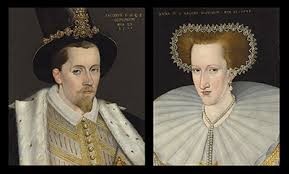James VI and I: The Man Behind the Myth
Chapter 2 : The Cowardly Lion: was James faint of heart?

Was James, as the Court and Character claims, of a ‘naturally timorous’ disposition? Was he a coward who lived in fear in his privy chambers? The answer is no. In mitigation of the charge, one need only look to his reign in Scotland, when he lived – literally – in fear of attack (indeed, in 1582 the young sovereign was actually kidnapped, in what would become known as the Raid of Ruthven; and throughout the early 1590s he and his new bride, Anna of Denmark, were repeatedly surprised in their palaces by the renegade Earl of Bothwell). Yet James responded to none of these assaults with cowardice. On the contrary, on multiple occasions he led armies; in 1589, on the eve of an anticipated battle against the Earl of Huntly, it was reported by one soldier that ‘His Majesty would not so much as lie down on his bed that night but went about like a good captain encouraging us.’ On the occasion of his marriage, James, frustrated that freak storms had prevented his bride sailing out from Norway, decided to follow in the footsteps of his chivalrous grandfather, James V, and claim his bride personally. Despite the continuing inclement weather, he hazarded his person on the high seas and sailed for Scandinavia himself. These were not the actions of an inveterate coward.
Whether James, in later life, wore padded doublets in fear of a sudden assassination attempt is unknown – the Court and Character is our only source. However, given the frequency of such attempts in the period (James’s father and paternal grandfather were both assassinated; Elizabeth I faced multiple assassination attempts; in France both Henri III and Henri IV were stabbed to death by assassins; and James himself, in addition to attacks in Scotland, faced the Gunpowder Plot), it would have been folly not to have taken precautions. Few would charge Elizabeth I or Henry VIII of having been pusillanimous, yet both were alert to the dangers of deadly plots and took steps to safeguard themselves, whether in the form of charms and antidotes against poisons or specially-tasked bodyguards.
In all, the idea of James VI and I as a coward is a false one. Yet it was not conjured up for no reason. In his lifetime – particularly his later lifetime – the king was derided as a stereotypical yellow-belly not because he was one, but due to the growing unpopularity of his anti-war stance. The 1610s and 1620s saw a resurgence in European religious conflict, with the Thirty Years War breaking out (in part due to the actions of James’s daughter, Elizabeth, and son-in-law, the Elector Palatine, who accepted the crown of Bohemia despite it pertaining to the Catholic Hapsburgs of Austria). In England, in response, a rising tide of hyper-Protestant belligerents gained ground. Suddenly, James’s peace policy – which he had pursued in earnest from his accession to the English throne and from which he never really deviated – was unpopular. Unpopular, too, was his desire to achieve Protestant concord by uniting the various anti-papal denominations with a view to then seeking a universal Christian accord with the Catholics. What the war party in England wanted was a Protestant hero-king – a martial figure who would place the country front and centre in an apocalyptic battle against the supposedly anti-Christian pope. What they found instead was a sensible, middle-aged man who, after a reign in Scotland full of conflict, wanted peace rather than war, and whose solution to the rise in European hostilities was talking rather than fighting. It was an easy enough step, both in his day and in subsequent generations, to mischaracterise King James as a coward when in fact he had known conflict enough and wished for a different outcome. In a warlike age, any man who preferred peace to war was, sadly, easily mocked. We should not be blinded by centuries-old propaganda – and we should relinquish the satirical image of the coward-king.
